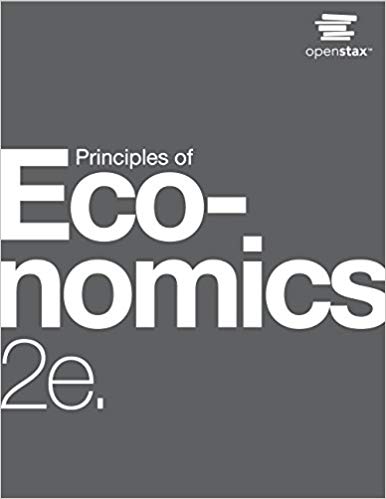
Principles of Economics 2e
2nd Edition
ISBN: 9781947172364
Author: Steven A. Greenlaw; David Shapiro
Publisher: OpenStax
expand_more
expand_more
format_list_bulleted
Textbook Question
Chapter 28, Problem 2SCQ
Given the danger of bank runs, why do banks not keep the majority of deposits on hand to meet the demands of depositors?
Expert Solution & Answer
Want to see the full answer?
Check out a sample textbook solution
Students have asked these similar questions
differentiate between keynesian and supply-side economics. how do they differ with respect to tax policy?
Calculate total wage cost and marginal cost
The South African government has decided to introduce a substantial, above-inflation increase in
the nominal amounts paid out in social grants each year. Making use of relevant diagrams
(including an AD-AS model), discuss how this change may impact the price levels and GDP growth
rates within the economy.
Chapter 28 Solutions
Principles of Economics 2e
Ch. 28 - Why is it important for the members of the Board...Ch. 28 - Given the danger of bank runs, why do banks not...Ch. 28 - Bank runs are often described as self-fulfilling...Ch. 28 - If the central bank sells 500 in bonds to a bank...Ch. 28 - What would be the effect of increasing the banks...Ch. 28 - Why does contractionary monetary policy cause...Ch. 28 - Why does expansionary monetary policy causes...Ch. 28 - Why might banks want to hold excess reserves in...Ch. 28 - Why might the velocity of money change...Ch. 28 - How is a central bank different from a typical...
Ch. 28 - List the three traditional tools that a central...Ch. 28 - How is bank regulation linked to the conduct of...Ch. 28 - What is a bank run?Ch. 28 - In a program of deposit insurance as it is...Ch. 28 - In government programs of bank supervision, what...Ch. 28 - What is the lender of last resort?Ch. 28 - Name and briefly describe the responsibilities of...Ch. 28 - Explain how to use an open market operation to...Ch. 28 - Explain how to use the reserve requirement to...Ch. 28 - Explain how to use the discount rate to expand the...Ch. 28 - How do the expansionary and contractionary...Ch. 28 - How do tight and loose monetary policy affect...Ch. 28 - How do expansionary, tight, contractionary, and...Ch. 28 - Which kind of monetary policy would you expect in...Ch. 28 - Explain how to use quantitative easing to...Ch. 28 - Which kind of monetary policy would you expect in...Ch. 28 - How might each of the following factors complicate...Ch. 28 - Define the velocity of the moneyCh. 28 - What is the basic quantity equation of money?Ch. 28 - How does a monetary policy of inflation target...Ch. 28 - Why do presidents typically reappoint Chairs of...Ch. 28 - In what ways might monetary policy be superior to...Ch. 28 - The term moral hazard describes increases in risky...Ch. 28 - Explain what would happen if banks were notified...Ch. 28 - A well-known economic model called the Phillips...Ch. 28 - How does rule-based monetary policy differ from...Ch. 28 - Is it preferable for central banks to primarily...Ch. 28 - Suppose the Fed conducts an open market purchase...Ch. 28 - Suppose the Fed conducts an open market sale by...Ch. 28 - All other things being equal, by how much will...Ch. 28 - Suppose now that economists expect the velocity of...Ch. 28 - If GDP is 1,500 and the money supply is 400, what...Ch. 28 - If GDP now rises to 1,600, but the money supply...Ch. 28 - If GDP now falls back to 1,500 and the money...
Additional Business Textbook Solutions
Find more solutions based on key concepts
The meaning for float and its three components.
Gitman: Principl Manageri Finance_15 (15th Edition) (What's New in Finance)
The approach on how Person X (holder) can purchase insurance to protect himself against a fall in the price of ...
Corporate Finance (4th Edition) (Pearson Series in Finance) - Standalone book
(Preferred stock valuation) What is the value of a preferred stock when the dividend rate is 16 percent on a $1...
Foundations Of Finance
1. Based on the descriptions and analyses in this chapter, would Boeing be better described as a global firm or...
Operations Management
3. Which method almost always produces the most depreciation in the first year?
a. Units-of-production
b. Strai...
Horngren's Financial & Managerial Accounting, The Financial Chapters (Book & Access Card)
Define costvolumeprofit analysis.
Horngren's Cost Accounting: A Managerial Emphasis (16th Edition)
Knowledge Booster
Similar questions
- Suppose the government imposes a fuel levy, identify, and discuss at least two ways in which this increase might have an effect on GDP growth, making use of the assumptions of the Keynesian model of income and expenditure.arrow_forwardCan you please assist Suppose the Government of Botswana has decided to implement a national minimum wage, but they have not yet decided at which rate to set this wage. With the aid of two separate diagrams, discuss the possible implications of setting this rate (i) at and (ii) below the equilibrium wage rate, respectively.arrow_forwardIf interest rate parity holds between two countries, then it must be true that: Question 3 options: The interest rates between the two countries are equal. The current forward rate is an unbiased predictor of the future exchange rate. The interest rate differential between the two countries is equal to the percentage difference between the forward exchange rate and the spot exchange rate. Significant covered interest arbitrage opportunities exist between the two currencies. The exchange rate adjusts to keep purchasing power constant across the two currencies.arrow_forward
- If interest rate parity holds between two countries, then it must be true that: Question 3 options: The interest rates between the two countries are equal. The current forward rate is an unbiased predictor of the future exchange rate. The interest rate differential between the two countries is equal to the percentage difference between the forward exchange rate and the spot exchange rate. Significant covered interest arbitrage opportunities exist between the two currencies. The exchange rate adjusts to keep purchasing power constant across the two currencies.arrow_forwardSuppose the indirect exchange rate for the Canadian dollar is 0.93. Based on this, you know you can buy: Question 2 options: $1 U.S. for $1.93 Canadian. $1 U.S. for $1.08 Canadian. $1 U.S. for $0.93 Canadian. $1.93 U.S. for $1 Canadian. $1.08 U.S. for $1 Canadian.arrow_forwardAccording to the relative purchasing power parity theory, high inflation in country A and low inflation in country B will cause the value of country A's currency to appreciate relative to that of country B. Question 1 options: True Falsearrow_forward
- How might different tax structures influence consumer behavior in luxury versus essential goods?arrow_forwardWhat is a competitive market?arrow_forwardلا. Assignniend abcpain the the three type of state- and explaining of the decannolly you know + 29 Explain Cu Marginal utility Jaw State the lid of diminishing. Explain the Concept of the aid of ha the relations and marginal uitity. Marginal finishing حومarrow_forward
- How does the change in consumer and producer surplus compare with the tax revenue?arrow_forwardConsidering the following supply and demand equations: Qs=3P-1 Qd=-2P+9 dPdt=0.5(Qd-Qs) Find the expressions: P(t), Qs(t) and Qd(t). When P(0)=1, is the system stable or unstable? If the constant for the change of excess of demand changes to 0.6, this is: dPdt=0.6(Qd-Qs) do P(t), Qs(t) and Qd(t) remain the same when P(0)=1?arrow_forwardConsider the following supply and demand schedule of wooden tables.a. Draw the corresponding graphs for supply and demand. b. Using the data, obtain the corresponding supply and demand functions. c. Find the market-clearing price and quantity. Price (Thousands USD) Supply Demand2 96 1104 196 1906 296 270 8 396 35010 496 43012 596 51014 696 59016 796 67018 896 75020 996 830arrow_forward
arrow_back_ios
SEE MORE QUESTIONS
arrow_forward_ios
Recommended textbooks for you

 Macroeconomics: Principles and Policy (MindTap Co...EconomicsISBN:9781305280601Author:William J. Baumol, Alan S. BlinderPublisher:Cengage Learning
Macroeconomics: Principles and Policy (MindTap Co...EconomicsISBN:9781305280601Author:William J. Baumol, Alan S. BlinderPublisher:Cengage Learning Macroeconomics: Private and Public Choice (MindTa...EconomicsISBN:9781305506756Author:James D. Gwartney, Richard L. Stroup, Russell S. Sobel, David A. MacphersonPublisher:Cengage Learning
Macroeconomics: Private and Public Choice (MindTa...EconomicsISBN:9781305506756Author:James D. Gwartney, Richard L. Stroup, Russell S. Sobel, David A. MacphersonPublisher:Cengage Learning Economics: Private and Public Choice (MindTap Cou...EconomicsISBN:9781305506725Author:James D. Gwartney, Richard L. Stroup, Russell S. Sobel, David A. MacphersonPublisher:Cengage Learning
Economics: Private and Public Choice (MindTap Cou...EconomicsISBN:9781305506725Author:James D. Gwartney, Richard L. Stroup, Russell S. Sobel, David A. MacphersonPublisher:Cengage Learning Exploring EconomicsEconomicsISBN:9781544336329Author:Robert L. SextonPublisher:SAGE Publications, Inc
Exploring EconomicsEconomicsISBN:9781544336329Author:Robert L. SextonPublisher:SAGE Publications, Inc Economics (MindTap Course List)EconomicsISBN:9781337617383Author:Roger A. ArnoldPublisher:Cengage Learning
Economics (MindTap Course List)EconomicsISBN:9781337617383Author:Roger A. ArnoldPublisher:Cengage Learning


Macroeconomics: Principles and Policy (MindTap Co...
Economics
ISBN:9781305280601
Author:William J. Baumol, Alan S. Blinder
Publisher:Cengage Learning

Macroeconomics: Private and Public Choice (MindTa...
Economics
ISBN:9781305506756
Author:James D. Gwartney, Richard L. Stroup, Russell S. Sobel, David A. Macpherson
Publisher:Cengage Learning

Economics: Private and Public Choice (MindTap Cou...
Economics
ISBN:9781305506725
Author:James D. Gwartney, Richard L. Stroup, Russell S. Sobel, David A. Macpherson
Publisher:Cengage Learning

Exploring Economics
Economics
ISBN:9781544336329
Author:Robert L. Sexton
Publisher:SAGE Publications, Inc

Economics (MindTap Course List)
Economics
ISBN:9781337617383
Author:Roger A. Arnold
Publisher:Cengage Learning